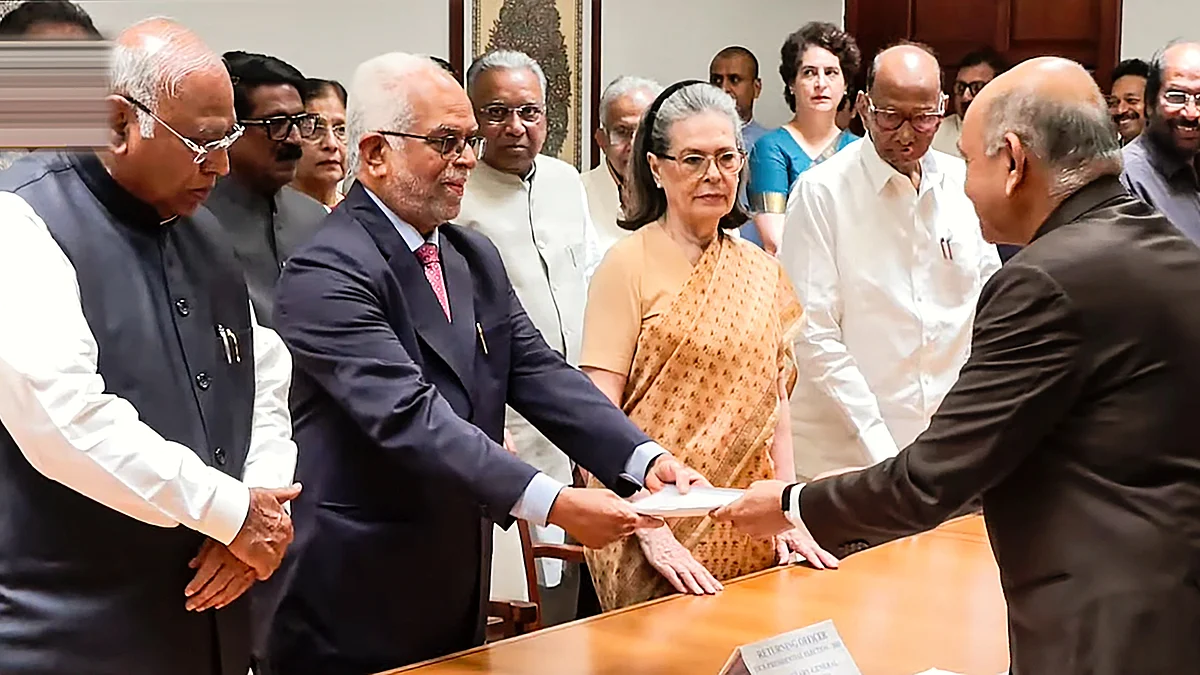Who is better suited as India's VP? RSS loyalist or ex-SC judge?
The VP election scheduled for 9 Sep will be between a ‘100 per cent RSS’ loyalist and a ‘politically neutral person’ and retired judge

‘Decent, friendly and unassuming’ are some of the adjectives being used to describe the NDA’s vice-presidential nominee. They certainly can describe the Opposition’s nominee as well. However, there the similarities end.
C.P. Radhakrishnan, an RSS volunteer since the age of 16, is described as ‘low key’ and ‘100 per cent RSS’. The Opposition nominee, who retired as a Supreme Court judge in 2011, has been active in public life ever since, heading the independent panel of experts in Telangana recently to assess the caste survey conducted in the state.
The NDA candidate has provided early indications of being loyal, pliant and obedient. In a post immediately after being nominated by the government, he went on to thank the “beloved people’s leader and the most respected and honourable prime minister Narendra Modi Ji, our beloved and most respected honourable home minister Amit Shah Ji, our beloved and most respected honourable central minister and BJP president J.P. Nadda Ji” for choosing him as the vice-presidential candidate. He did not forget to thank the ‘most beloved’ parliamentary board members, other Union ministers and NDA partners either.
It remains to be seen if this humility and obsequiousness extends to the Opposition benches in the Rajya Sabha. What can, however, be said with certainty is that he is unlikely to allow MPs to miss former VP Jagdeep Dhankhar for too long, that is if he wins.
The outgoing VP, whose sudden and mysterious resignation on 21 July, ostensibly on health grounds, triggered the election in the first place, continues to be incommunicado, adding to the suspense. The voluble Dhankhar, who famously said bowing was a habit with him (jhukna meri fitrat hai) has not even emerged to greet the ‘most beloved’ NDA nominee so far.
Whether the country need another RSS acolyte in yet another Constitutional office is something the MPs will have to consider. Is it not enough to have a President and prime minister from the RSS?
The anxiety of the government to have a pliant Rajya Sabha chairman is well understood; that the government did not consider the ‘good work’ done by Rajya Sabha deputy chairman Hari Vansh enough to merit an upgrade, is worth a thought. Hari Vansh, former media advisor to Chandrashekhar as PM, did what Dhankhar would have done while conducting the monsoon session of Parliament. But he is clearly not acceptable as he is not ‘100 per cent RSS’.
The NDA candidate’s public life extends to two terms as MP from Tamil Nadu, besides stints as governor of Jharkhand and Maharashtra. The Tamil Nadu connection, where elections are due next year for the state Assembly, may have tilted the scale in his favour. But is that qualification enough to be the VP? While it is argued that the post is largely ceremonial, the chairmanship of the Rajya Sabha is not inconsequential. Who would serve better as RS chairman is the question.
Justice (retired) B. Sudershan Reddy, on a pinch, appears far better suited to serve as RS chairman with his varied experience and knowledge of the law and Constitution.
After filing his nomination, the retired justice in a statement said his life “in public service as a judge of the Supreme Court of India, as a student of law, and as a citizen rooted in the democratic traditions of this Republic” has taught him that “the true strength of India lies in the dignity of every individual, the protection of Constitutional morality, and the unity in our diversity”.
“The Vice-President, as the Chairperson of the Rajya Sabha, carries the responsibility of safeguarding the highest traditions of parliamentary democracy,” Reddy also said in the statement.
During his five-year tenure as Supreme Court judge, Justice Reddy heard several Constitutional cases. His most consequential judgment was the celebrated Nandini Sundar v. State of Chhattisgarh in 2011, in which the top court banned the Salwa Judum militia, directing that the practice of using tribal youth as special police officers to counter Naxal insurgency be brought to an end.
In 2011, he was also part of the top court bench that termed money secreted away in foreign banks as “proceeds of pure and simple theft” and dared the Centre to stop it from holding a general inquiry, in public interest, into the government’s investigations into Indians who have parked “gigantic amounts plundered from national economy” in tax havens across the world. Significantly, the UPA was in power at the time.
Upon retirement, he was appointed the first Lokayukta of Goa by BJP chief minister Manohar Parrikar but resigned in just seven months, citing personal reasons. In 2022, the Supreme Court appointed him an “oversight authority” to ensure that mining operations in Karnataka follow the Comprehensive Environmental Plan for Mining Impact Zone, a project to restore land in districts such as Ballari, Chitradurga, and Tumakuru affected by rampant mining.
In his home state Telangana, Justice Reddy headed the independent expert working group set up to evaluate the results of the state caste survey. The committee submitted a 300-page report to the CM in July.
With the government finding that the report provided invaluable insights into caste dynamics in the state, state Congress leaders were convinced that the party should find a bigger role for the former judge. Given that he is seen as a politically neutral person with no ideological baggage, he was considered a top choice for the post of Vice-President, reported the Indian Express.
Follow us on: Facebook, Twitter, Google News, Instagram
Join our official telegram channel (@nationalherald) and stay updated with the latest headlines
